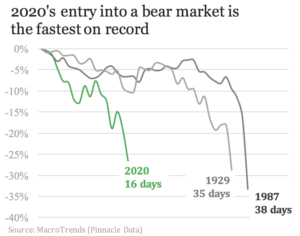The Coronavirus has taken financial markets by storm. Very little attention was paid to the virus as it developed in China but once its power was felt in Europe, and later in the US, financial markets reacted quickly. In this piece I will try to answer two questions: what happened, and what do we do now?
What Has Happened?
Once investors realized the severity of COVID-19’s exponential growth in western countries, equity markets declined quickly. In fact, as measured from the peak of the market, we have entered this bear market at the fastest pace ever.

